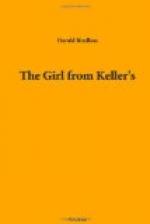He put the object in a vise and hammered down the end, which did not break. “That’s all right, anyhow; tough and most as soft as iron. But steel’s sometimes treacherous; you want to be careful—”
“Could you tell by looking at it if a piece was burned?”
“Well,” said the smith thoughtfully, “it’s not always easy, but if the thing was badly scaled, I’d be suspicious. Of course, there might be some scale—”
“But the wedge looked all right when you finished it?”
“It certainly did,” said the smith, who hesitated. “Say do you reckon it was the bolt going that let down your frame?”
“So far, I imagine it was the weight of snow. The pile ran back up the hill and must have made a crushing load. For all that, I’m curious about the wedge.”
“Well,” said the other, “If it was the wedge, I’m surely sorry! The blamed thing is burned, though I don’t know how. But if she was loaded up too much, she might have broken anyhow, burned or not.”
“I expect so,” said Charnock, getting up. “You needn’t bother about the matter; I’m not blaming you.”
His face got very grim when he went out, for what he had learned fitted in with his suspicions. Wilkinson had heard the smith say that steel could be easily spoiled, and sometimes came to the forge when the man was away. Then there was the rough, scaly look of the wedge, which had been put out of the smith’s sight, inside the split shank of the bolt. Everything was plain; Charnock knew why the tie gave way and allowed the frame to fall.
The thought of the treacherous injury made his blood boil. The thing had been so easily done; five minutes’ work at the blower, a few strokes with a big hammer when the steel was dangerously hot, and then, perhaps, a sudden quenching in the snow, when the steel ought to have slowly cooled. He had been wrong in thinking men would not risk much for the sake of revenge. Wilkinson had foully struck his comrade and perhaps crippled him for life. But the cunning brute must be punished, and driven from the camp, and when he left should carry marks that would make it difficult to forget his offense.
Charnock, however, could not at once seek out his antagonist. He had promised Festing to carry on the contract; they had had a number of setbacks, and the accident would cost them much. Wages were high and it was essential that the men should be usefully employed, while there was now nobody but himself to superintend the work. Besides, the doctor might want him and he must call at the shack every now and then to see how Festing was getting on. It looked as if he must leave Wilkinson alone until he had more leisure in the evening.
It was a trying day. The doctor sent him errands and sometimes allowed him to come in for a few minutes, but his reports were not favorable, and Festing was either asleep or too feeble to talk. When work stopped and Charnock went to the shack after some hours’ absence the doctor looked very grave.




